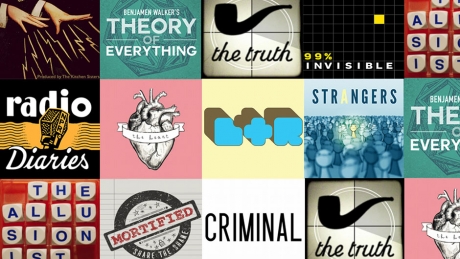
You may have heard Julie Shapiro reporting on NPR or maybe you’ve heard one of the many storytelling podcasts she’s produced on Radiotopia. Julie Shapiro is the Executive Producer of Radiotopia from Public Radio Exchange, or PRX— a curated network of cutting-edge podcasts like their newest addition, Ear Hustle, which chronicles life in prison from San Quentin prisoners themselves. Julie co-founded the Third Coast International Audio Festival and was the executive producer of the Australian Broadcast Corporation’s Creative Audio Unit. Julie originally coined the term “Radiotopia” in a speech at the Third Coast Festival, describing it as a place where awesome stories live.
“I never had any media training or journalism training. I had a sociology degree.”
“Around college and high school even, I became very invested in music. I loved the indie riot girl scene.”
“The sense of storytelling came in college. I never looked back.”
“I had music festival experience, documentary experience which helped me co-found the Third Coast Audio Festival.”
“My family wasn’t an NPR devoted family. I came to public radio in college.”
“After sneaking down to watch ‘The Day After’ happened on broadcast on TV, the shock jock on the radio was counseling people on air. I was so calmed by his voice. I turned to radio to understand the world. It really stuck with me.”
“A long trip after college got me hooked on public radio. Driving around, listening listening listening. I started to realize the value of what I was hearing.”
“Everyone has a podcast idea so last spring Radiotopia ran a contest, Podquest. People had to submit a 2-minute idea. We got over 1500 entries.”
“The pitch from San Quentin was so unique. The original tape was really ear catching. We had to learn more.”
“As a society we’re obsessed with prison and crime and jail. There are huge communities of people who only listen to crime podcasts.”
“There’s a lot of excellent journalism being done in prison.”
‘We’re journeyists not journalists.’— Ear Hustle producer
“There’s a different mandate for prisoners. How can you make the listener care about them and think of them as human?”
“There are so many podcasts out there with a limited number in the day.”
“I would always argue why not make it the best you can. Invest in equipment. A lot of shows start and stop within the first 6.”
“Use sound to get beyond talking between a microphone.”
“The number one thing I learned is podcasts are hard to make. There’s a lot more to it.”
“Logo is super important, the feel, how will you promote it. The burnout comes from not gaining an audience. The dream is sponsorship so you can get paid to do it.”
“Have a few people on your team. To do it yourself is really hard. You want direction and support.”
“The model with Radiotopia is the supporting structure we can help grow other podcasts grow.”
“The Illusionists was a show that started from scratch and keeps growing and growing.”
“Ear Hustle has gotten more of a response than we expected. The subject of incarceration has touched so many people.”
“I think your eyes translate so much info to your brain before you even realize it. On the radio it’s just voice. Radio is a very visual medium.”
“There’s something powerful and personal about the voice.”
“Third Coast Audio Festival’s idea was taking the literary festival and film festival model and turned to independent audio producers to celebrate the important stories of the world around us.”
“We launched the festival before MP3s existed. We championed documentary audio producers.”
“We have had a lot of fun with Pidgey the Pigeon as an animal mascot. What was unique to Chicago and Third Coast, so we thought of a cow but it was too close to the Bulls logo. We settled on the pigeon because it was scrappy and urban and resourceful.”
“I was irked by seeing only men rise to the surface of any article about radio.”
“The ratio of podcasts of shows with women’s names in them was staggering.”
“The technology made it possible for podcasts to exist but we were seeing that world being dominated by men.”
“We’ve seen so many women succeed and accomplish so much in the podcasting world. But there can always be more. And more diversity.”
“All the people behind the top podcasts were women but they weren’t getting recognition.”
“The first podcast that stuck out to me as taking radio into podcast form was Love and Radio.”
“Early in my life I was huge Sonic Youth fan. Brian Eno became a big musician in my mind.”
“For those thinking of creating a podcast: Create a plan about why you’re doing it and how it will sound is important. Listen to a ton of different podcasts. Go into the game educated. Which ones move you? And meet the community. The stronger the community the better the shows.”
“It’s worth investing in a bit of good equipment. You need a good microphone.”
“ZOOM makes affordable, small, handheld records. Transom.org does an amazing comparison of the market.”
Join ‘Dot Complicated with Randi Zuckerberg’ every Wednesday at 12pm ET, 9am PT only on SiriusXM Business Channel 111!











